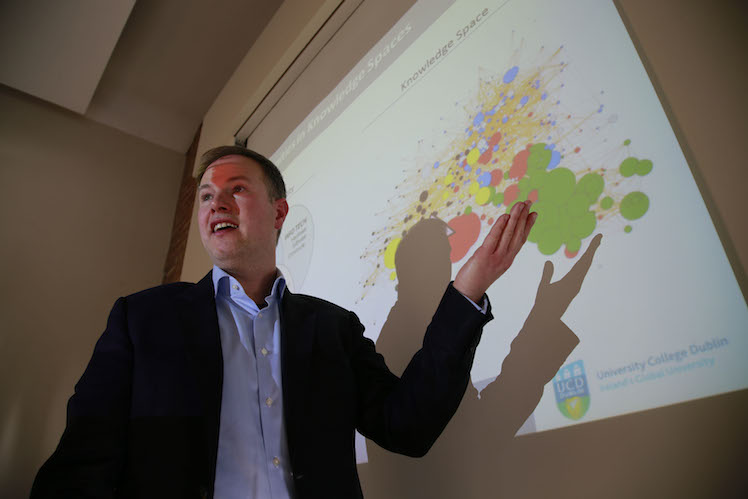News and Events
- Professor Mark Scott elected to Fellowship of Academy of Social Sciences
- Professor Finola O'Kane appointed as a Senior Fellow at Dumbarton Oaks
- Gerd Albers Award 2023 – Best article
- Prof Eoin O’Neill announced as new Director of the UCD Earth Institute
- Professor Mark Scott appointed to Board of the Heritage Council
- Streetlife Design Competition: special mention for landscape graduates
- Prof Francesco Pilla launches new bike libraries for Dublin primary schools
- Peter Cody and Mary Laheen are part of a team representing Ireland at La Biennale di Venezia
- The growing research impact of APEP; a global leader in UCD
- Cathal O'Neill Obituary
- Foreign Exchange Book Launch
- Home retrofits may need to be re-done in ten years, Oireachtas committee hears
- Visiting Professor announcement
- Documenting Maritime Cultural Heritage
- Assessing Flood Risk Awareness Contributes to Environmental Policy Formation
- Supporting Climate Action Through Tree Planting recognised in UCD Research Impact Competition
- Two Student Winners in the GLDA Student & Graduate Design Competition 2022
- Empowering People to Address the Problems of Climate Change
- Building Climate Action Locally: Tools from the CCAT Project
- 2021 Archive
- 2020 Archive
- 2019 Archive
- 2018 Archive
- 2017 Archive
- DIGITAL MATTERS: Research Lecture Series 3
- Donaghy + Dimond Architects
- Environmental modelling provides solutions for greener cities
- DIGITAL MATTERS: Research Lecture Series 2
- How can we make cities better places to live, asks new UCD centre
- The Inchicore Model School: a 21st-century design on education
- DIGITAL MATTERS: Research Lecture Series 1
- Professor Shane O’Toole named as RIBA International Fellow 2018
- Eco-Plan: Upping the game for green spaces in urban planning
- Two UCD academics receive a 2017-2018 Fulbright Irish Award
- Grafton Architects receive Architecture award
- Royal Irish Academy elects UCD academics
- Planning Futures
- Two UCD Architecture Students to Attend U21 Summer School
- Le:Notre Institute international student competition
- iSCAPE - Improving the Smart Control of Air Pollution in Europe
- Consultation Event on the National Planning Framework
- Handcrafted Brutalism
- New Economic Framework to Boost Innovation
- RIAI Honours Dr Ellen Rowley and Shane O’Toole
- UCD Architecture played host to Bijoy Jain from Studio Mumbai
- Grafton Architects chosen to curate Venice Architecture Biennale
- 2016 Archive
€1.5m award for UCD study on developing framework for regional prosperity in Europe
Wednesday, 29 January, 2025

Pictured: Dr Dieter Kogler, Associate Professor UCD School of Architecture, Planning and Environmental Policy, who will carry out the TechEvo study on making smarter location-based investment decisions that will drive regional prosperity in Europe
An investigator at University College Dublin has been awarded €1.5 million to carry out research that would enable policymakers to make location-based investment decisions to drive regional prosperity in Europe.
The aim of the project is to produce a series of economic indicators, models and tools which will enable firms and policymakers to boost innovation and drive economic growth across the European regions.
The project will also deliver an advanced science and technology policy evaluation tool.
Dr Dieter F Kogler, Associate Professor and early-career researcher in the UCD School of Architecture, Planning and Environmental Policy, will receive funding, over five years, for the study entitled, ‘Technology Evolution in Regional Economies’ or TechEvo. The (opens in a new window)European Research Council (ERC) are providing the funding for the research under the ERC Starting Grant initiative.
The research will apply a ‘bottom-up’ approach to understanding and enabling knowledge-based economic growth. Using this methodology, local scientific and technical capabilities will form the basis of the development of regional strategic policies to boost innovation and economic growth.
To achieve this, Dr Kogler will employ his novel concept of ‘knowledge spaces’ – a tool capable of identifying current economic development deficiencies, as well as future opportunities for innovative activities, within urban centres and in regional economies.
Dr Dieter Kogler’s research focus is on the geography of innovation and evolutionary economic geography.
“To date, the way in which specific regional knowledge capabilities influence the evolution of local technology trajectories and thus shape geographies of economic prosperity have not yet been considered systematically,” he said.
“Through the TechEvo research project, we will provide ground-breaking insights into how innovative entities and individual inventors are embedded in social and cognitive, local and non-local networks, and how regional technological change is shaped through entry, exit, and selection processes.”
Professor Orla Feely, UCD Vice-President for Research, Innovation and Impact said she was delighted that this funding award has been granted, as it corresponds to “one of UCD’s major research themes, namely Culture, Economy and Society”.
“I have no doubt that the results from this research, and the implementation of the models and tools generated, will result in delivering significant economic and societal impact, not only in Ireland but across Europe.”
ERC Starting Grants are awarded under the ‘excellent science pillar’ of Horizon 2020, the European Union’s research and innovation programme and aim to support a new generation of top researchers in Europe.
Professor Mark Ferguson, Director General, (opens in a new window)Science Foundation Ireland and Chief Scientific Adviser to the Government of Ireland, said: “Work like this is much needed in order to develop more effective policy measures in support of emerging technologies and smart specialisation strategies."
By: Jamie Deasy, digital journalist, UCD University Relations